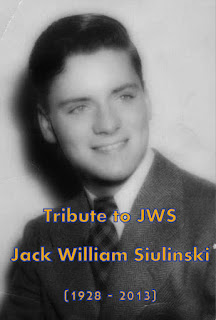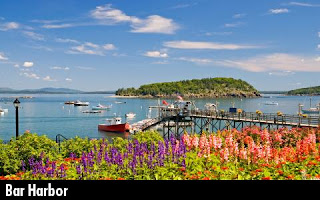Preface: The next few blog posts are segments from the speech I delivered on April 6, 2013 to celebrate the life of my Dad, Jack William Siulinski.
From interviewing my Dad for about 5 hours in 2007, I got to know him on a different level. He really provided me the motivation to research our family history. I wanted to know more about the family that he knew so little about on his father's side. The picture to the right is Jack's grandfather, Albert Szulinski, who lived in New York.
One of the things I learned from the interviews was that Jack grew up in two very different environments: the city life of Portland where he graduated from Deering High School, and the rural community of Jemseg, New Brunswick, Canada, where he spent many summers visiting his mother’s extended family. One of Dad’s earliest memories was a long car ride to Canada where he distinctly remembered looking out a small window while his uncle drove the long, winding, dirt roads through the wilderness of Maine to get to Canada (see the map below).
 |
| Courtesy of google maps |
Jack's grandmother, Hattie Dykeman, always had homemade butter, bread and pies. In talking with Dad’s brother, Adam, recently, the scent came back to him even today of the homemade butter and hot molasses over fresh bread. A fond memory of something Dad did with his grandfather, Joshua Dykeman, was getting up at 4:30 in the morning to go turn out the light in the lighthouse at Grand Lake.
The Siulinski’s of Portland were much loved by their Jemseg relatives, and the yearly visits were much anticipated. Only 5 years ago, in 2008, the Siulinski brothers, Jack and Adam, and their wives took a trip to visit the Canadian relatives for a family reunion in Saint John, New Brunswick, but did not visit Jemseg. It was June of 1996 that Dad last visited the farm and the lighthouse on Grand Lake.
Before my Dad went into the Navy, he had six weeks of military training while still in high school at the Maine Maritime Academy in Castine. He referred to the transition from the academy to the Navy as “coming out of the frying pan and into the fire”. What may have led Dad to choose to enlist in the Navy was seeing the fleet visiting Portland when World War II was still going on.
 |
| Source: wikipedia |
Life in the Navy took Dad from the heat of the South Pacific to the frigid climate of Adak, Alaska. He entered the Navy in August 1946 as a Construction Electrician. In California, he attended a Radio and Communications school in the Seabees program.
The next post will explore the marriage, family and career of Jack which all began in the early 1950's.
Note: Some of the pictures in this post were provided by Adam and Jean Siulinski of South Portland, Maine, and Marilyn Currie of New Brunswick, Canada.














